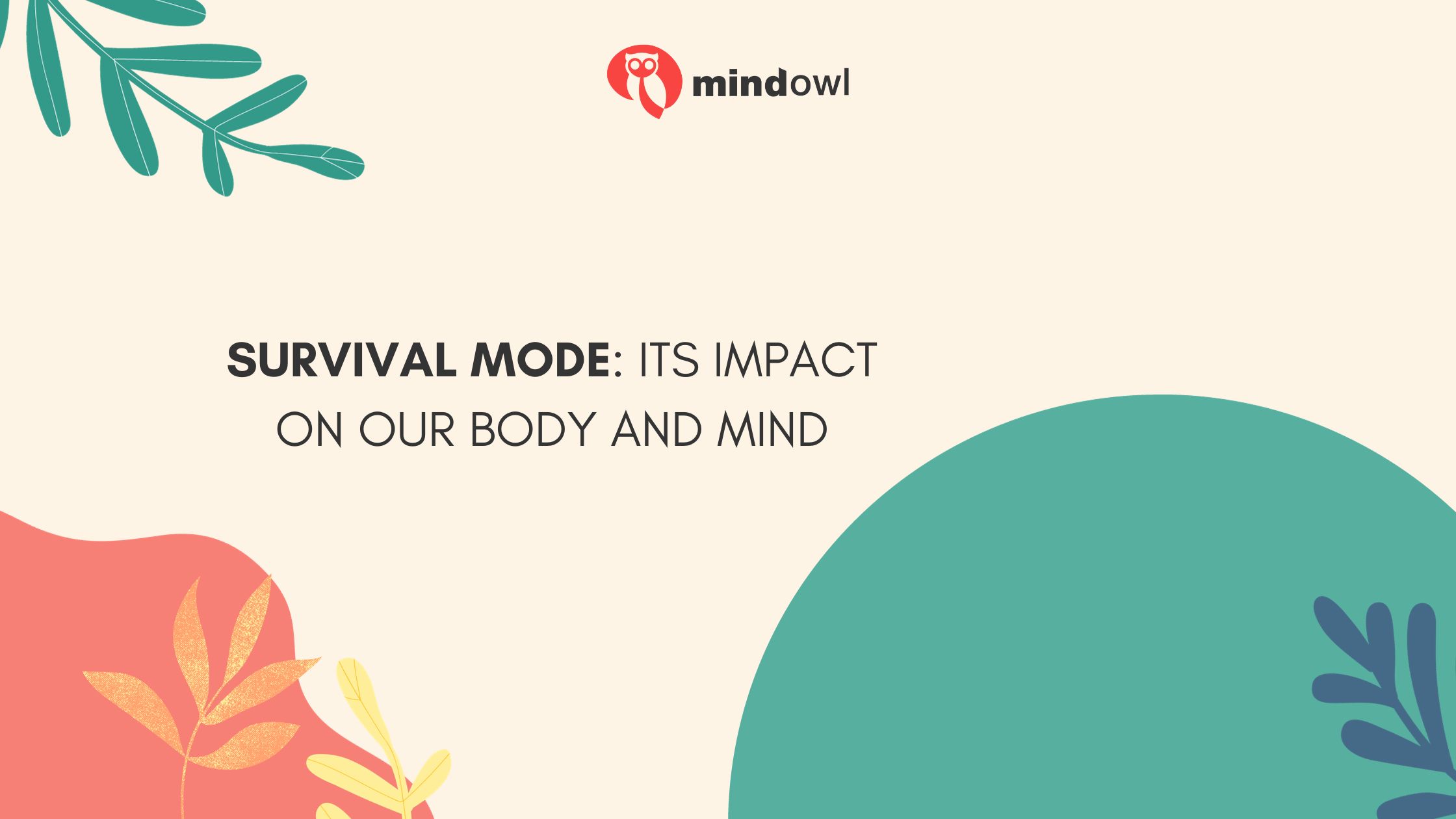In today’s fast-paced world, it’s not uncommon to find ourselves constantly in “survival mode.”
This term describes a state of heightened stress and alertness, often triggered by various life challenges and demands. While survival mode can be a useful response to imminent danger, it can also become a chronic state that takes a toll on our physical and mental well-being.
In this article, we will learn what survival mode is, how it affects our body and mindfulness, and how cognitive behavioral therapy (CBT) can be a valuable tool in managing and overcoming its adverse effects.
Understanding Survival Mode
Survival mode, also known as the “fight-or-flight” response, is a natural and essential reaction to threats. When our brain perceives danger, it activates the sympathetic nervous system, releasing stress hormones like adrenaline and cortisol.
These hormones prepare our body to respond quickly: our heart rate increases, our muscles tense, and our senses sharpen, allowing us to face or flee from danger effectively.
However, in modern life, the threats we face are not always physical, and survival mode can be triggered by various stressors, such as work pressures, financial worries, relationship issues, or even constant exposure to negative news. When we repeatedly experience these stressors, our body can get stuck in a prolonged state of heightened alertness, leading to chronic stress.
The Physical Impact of Survival Mode
- Cardiovascular Effects: One of the most significant impacts of prolonged survival mode is on our cardiovascular health. Constant activation of the fight-or-flight response can lead to increased blood pressure and heart rate, making the risk of heart problems higher over time.
- Immune System Suppression: Chronic stress can weaken the immune system, making our body more susceptible to illnesses and infections. This is because stress hormones, like cortisol, suppress the body’s natural immune response.
- Digestive Issues: Survival mode can also disrupt our digestive system, leading to problems like indigestion, irritable bowel syndrome, and even long-term gastrointestinal issues.
- Sleep Disturbances: Heightened stress levels can result in sleep disturbances, such as difficulty falling asleep as well as staying asleep. Over time, sleep deprivation can negatively impact our cognitive function and overall health.

The Impact on Mindfulness
Survival mode’s influence isn’t limited to our physical health; it also affects our mental well-being and mindfulness. When we’re constantly in this state of heightened alertness, our ability to stay present and fully engage with our surroundings is compromised.
- Reduced Focus and Clarity: The stress and anxiety associated with survival mode can make it challenging to concentrate on tasks, leading to reduced productivity and increased frustration.
- Emotional Dysregulation: Chronic stress can lead to mood swings, irritability, and heightened emotional responses. This makes it difficult to maintain emotional balance and respond calmly to challenging situations.
- Negative Thought Patterns: Survival mode can contribute to the development of negative thought patterns and rumination. When our minds are constantly racing with worry, it’s challenging to break free from these cycles of negative thinking.
- Impaired Decision-Making: In survival mode, decision-making often becomes impulsive and reactive rather than thoughtful and deliberate. This can have consequences in both our personal and professional lives.
Cognitive Behavioral Therapy (CBT) as a Solution
Cognitive Behavioral Therapy (CBT) is a well-established therapeutic approach that can help patients break free from the grip of survival mode and its negative effects. This type of therapy focuses on identifying and working on changing maladaptive thought behaviors and patterns that contribute to stress and anxiety.
Here’s how CBT can be a valuable tool in addressing survival mode.
5 Key CBT Techniques for Addressing Survival Mode
Identifying Negative Thought Patterns
CBT helps individuals become aware of their negative thought patterns and beliefs that contribute to chronic stress. By recognizing these patterns, individuals can begin to challenge and change them.
Developing Coping Strategies
CBT equips individuals with practical coping strategies to manage stress and anxiety. This includes relaxation techniques, problem-solving skills, and mindfulness exercises that can help individuals stay grounded in the present moment.
Promoting Mindfulness
Mindfulness is a core component of CBT. It teaches individuals to be more present and aware of all their thoughts and emotions without judgment. This practice can help individuals move out of survival mode and cultivate a more balanced and calm mindset.
Setting Realistic Goals
CBT helps individuals set realistic and achievable goals, reducing the pressure to constantly be in survival mode. By breaking tasks into manageable steps, individuals can regain a sense of control over their lives.
Improving Communication Skills
Survival mode can strain relationships, leading to communication breakdowns. CBT helps individuals improve their communication skills, fostering healthier interactions with others.
The Detrimental Effects of Chronic Survival Mode
Survival mode, while a natural response to threats, can have detrimental effects on our body and mindfulness when it becomes chronic. It takes a toll on our health, disrupts our emotional well-being, and impairs our ability to stay present and mindful.
Cognitive Behavioral Therapy (CBT): A Path to Well-Being
However, with the help of cognitive behavioral therapy, individuals can learn to break free from the cycle of chronic stress and regain a sense of well-being. CBT offers practical tools and strategies to manage stress, identify and change negative thought patterns, and cultivate mindfulness.
The Role of Mindfulness and a Holistic Approach
In addition to CBT, it’s important to mention the role of mindfulness practices in managing survival mode and promoting mental health.
Mindfulness techniques, meditation, and deep breathing exercises can complement CBT by enhancing self-awareness and reducing the impact of chronic stress. These practices encourage individuals to stay grounded in the present moment, fostering a sense of calm and balance.
Moreover, adopting a holistic approach to mental health is crucial. This includes paying attention to diet, exercise, and sleep patterns, as they all play a very significant role in managing stress levels and promoting overall well-being. Regular physical activity, adequate sleep, and a balanced diet can help mitigate the physical and mental toll of survival mode.
Professional Help
It’s important to recognize that seeking professional help from a therapist or a counselor trained in CBT can be a transformative step for individuals struggling with chronic stress and survival mode. These professionals can provide tailored guidance and support to address specific challenges and develop personalized coping strategies.
Final Thoughts
Survival mode may be the body’s response to stress, but when it turns chronic, it can erode our physical and mental health.
Cognitive Behavioral Therapy, combined with mindfulness practices and a holistic approach to well-being, offers a comprehensive solution for managing and ultimately overcoming the adverse effects of survival mode.
By taking proactive steps to address chronic stress, one can regain control over their lives and cultivate a state of well-being where they can thrive, both physically and mentally.
MindOwl Founder – My own struggles in life have led me to this path of understanding the human condition. I graduated with a bachelor’s degree in philosophy before completing a master’s degree in psychology at Regent’s University London. I then completed a postgraduate diploma in philosophical counselling before being trained in ACT (Acceptance and commitment therapy).
I’ve spent the last eight years studying the encounter of meditative practices with modern psychology.


